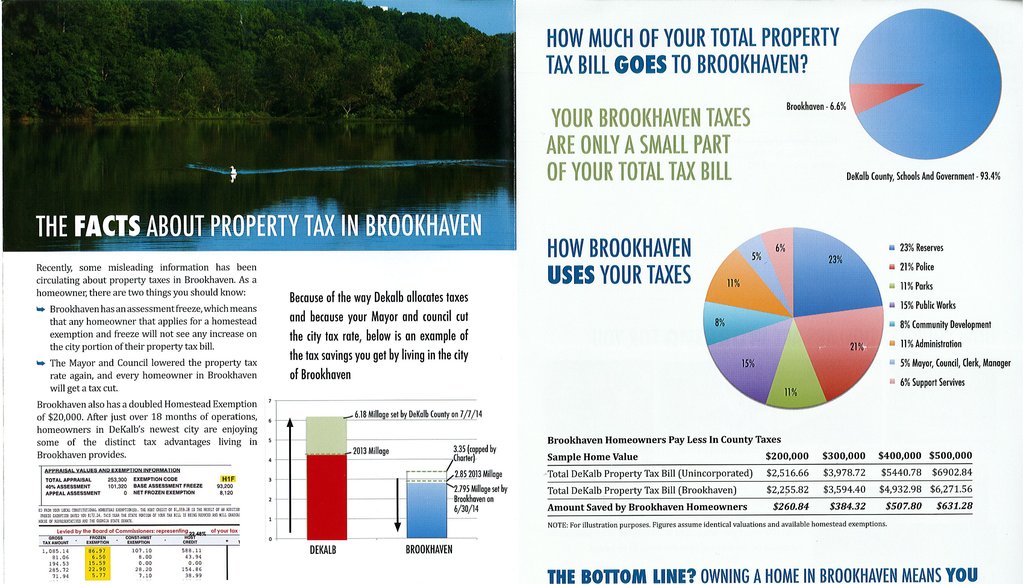

Our only agenda is to publish the truth so you can be an informed participant in democracy.
We need your help.


Brookhaven flier
When Brookhaven became Georgia’s newest city in December 2012, supporters promised a local government closer to residents and their needs.
Last month, leaders of the city of 50,000 mailed out a flier to every property owner in the north-central DeKalb County city, touting the "facts" about property taxes there.
Two pie charts in the flier show details such as how the city uses its tax collections. But even more specific was a chart listing the hundreds of dollars city homeowners would save on their tax bills compared with their counterparts in unincorporated DeKalb.
The chart shows owners of a home worth $200,000 save $260.84 vs. the same home in the county. For a home worth $500,000, the savings are $631.28, according to the chart.
Claims of similar tax savings began when Sandy Springs became Georgia’s seventh-largest city overnight in 2005.
Brookhaven backers promised in meetings a new city would mean lower taxes and better services.
Opponents, meanwhile, have claimed the new cities overstate revenue in their budgets and therefore need to either cull services or raise taxes.
Such broad battles are out of our purview for a single fact check. But PolitiFact Georgia thought we’d take the specific tax bill for a ride on the Truth-O-Meter to get at the general idea of whether cities can mean lower tax bills.
Brookhaven Mayor J. Max Davis said the city mailed the fliers to address internal division in the city, which was created with 55 percent of the vote.
The city had planned to maintain its municipal rate of 2.85 mills for the second year. Several vocal residents, though, correctly argued that the city was effectively raising taxes by not adopting the rollback rate of 2.569 mills.
(Adopting the rollback rate ensures governments will raise the same amount of money through taxes, regardless of property values, each year. Even maintaining the same rate can mean higher taxes if an individual’s home value increases).
Davis said leaders felt the rollback rate would be premature for the young city. The Brookhaven City Council finally adopted a rate of 2.795 mills in late June.
"Our main impetus behind the flier was to educate residents that we were not raising taxes, that they still save money from being in the city," Davis said.
Brookhaven property owners with a homestead exemption qualify for the city’s assessment freeze, which will hold the value steady on the city portion of taxes.
But that doesn’t address the more complex issue of county taxes. And that picture is plenty complicated in DeKalb, one of only two counties in the state where voters have approved the homestead option sales tax, or HOST, to offset property taxes.
As long as buying is up, and values don’t explode, DeKalb then has the cash from sales tax revenue to offset about half of the county millage rate, which remains 21.21 in the unincorporated county.
This year, the HOST credit will reduce county taxes on a home by about 58 percent.
The chart that appeared in Brookhaven’s flier came from internal working documents, which estimated the HOST credit would be about 45 percent.
The higher HOST credit means much lower county taxes. That disproportionately benefits homeowners in unincorporated DeKalb, who get the credit on a bigger part of their tax bill since they do not pay city taxes.
That closes the gap between the tax bill for the same-value home in the city and county.
But Brookhaven’s chart is also missing the 1.67 mill tax that residents of unincorporated DeKalb pay to cover the debt of new parks and libraries. Brookhaven residents must still pay that debt, since they were part of unincorporated DeKalb when the money was borrowed.
Brookhaven’s finance director, Bonnie Kline, acknowledges missing the park/library debt in her calculations.
Adding that cost – which does not qualify for any HOST credit – further narrows the gap between homes in the city and county.
Based on millage rates alone, a homeowner with property valued at $200,000 in Brookhaven would save $58.52, assuming both a frozen assessment and homestead exemption. The tax bill for a home worth $500,000 would be $110.93 lower.
Add in the fact that Brookhaven residents pay $12 more in stormwater fees than those in unincorporated DeKalb, and the final savings is less than $50 and $100, respectively, DeKalb Deputy Tax Commissioner Robert Goodman said.
"On the face of it, to say your property tax bill will be lower in Brookhaven is correct, but not nearly by the amounts stated," Goodman said.
Brookhaven claimed very specific savings, to the tune of hundreds of dollars, to residents on their tax bills in a recent flier. The premise of savings is accurate, but the numbers are off significantly.
We rate the claim Half True.
City of Brookhaven mailer
DeKalb County 2014 Budget Revision
Interview with Brookhaven Finance Director Bonnie Kline, July 23, 2014
Brookhaven Post, "Brookhaven lowers tax rate," June 30, 2014
Atlanta Journal-Constitution, "Sales tax creates lower property taxes in DeKalb," June 21, 2012
Interview with DeKalb County Deputy Tax Commissioner Robert Goodman, July 23, 2014
Interview with Brookhaven Mayor J. Max Davis, July 24, 2014
In a world of wild talk and fake news, help us stand up for the facts.
